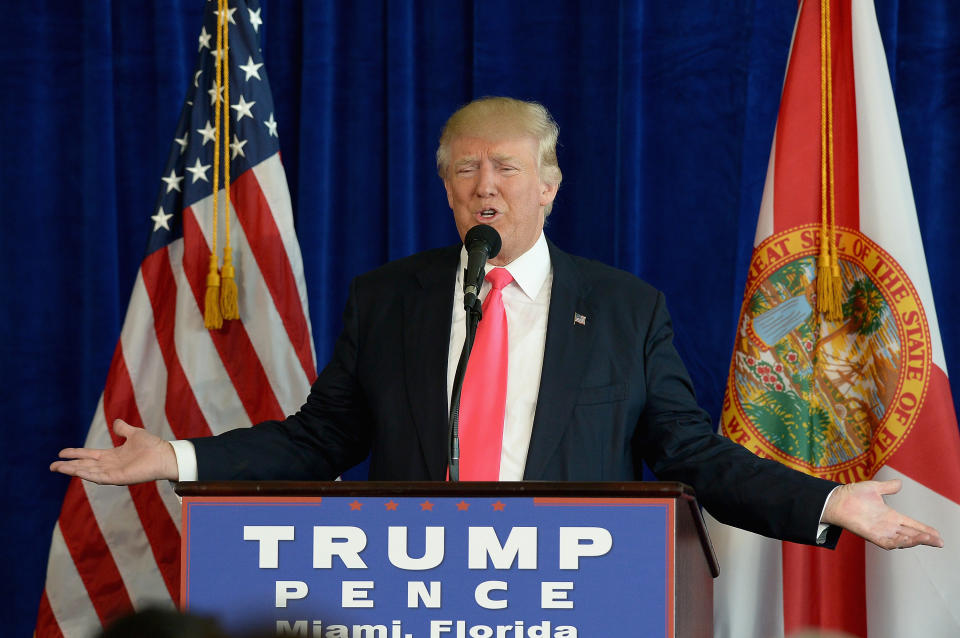Mueller report: Trump asked aides to help find Clinton's 'missing' emails
WASHINGTON — President Trump personally directed his advisers and contacts to help find former Secretary of State Hillary Clinton’s “missing” 30,000 emails, according to special counsel Robert Mueller’s report on his investigation into Russian meddling in the 2016 U.S. presidential election.
In July 2016, Trump publicly called for Russian hackers to find the emails during a campaign speech, saying, “Russia, if you’re listening, I hope you’re able to find the 30,000 emails that are missing.”
Trump, in later written responses to the special counsel’s questions, said he made those comments “in jest and sarcastically.” However, according to interviews the special counsel conducted with his associates, then-candidate Trump was taking the prospect of discovering the emails seriously.
“Throughout 2016, the Trump Campaign expressed interest in Hillary Clinton's private email server and whether approximately 30,000 emails from that server had in fact been permanently destroyed, as reported by the media,” wrote the Office of Special Counsel in its report, released Thursday.
The report states that “Trump asked individuals affiliated with his Campaign to find the deleted Clinton emails.” While the investigators did not find coordination between Russians and Trump officials in finding the emails, or any evidence of success in uncovering them, the report concludes that some of those efforts “were pursued to some degree.”
According to Mueller’s report, Trump privately asked members of his campaign, including Michael Flynn, who would go on to become the president’s first national security adviser, to find the emails. The report references Flynn’s recollections of interactions with then-candidate Trump. Additionally, former campaign adviser Rick Gates recalled Trump being frustrated that the missing emails had not “been found.”

Flynn tasked multiple people with carrying out Trump’s wishes, including Barbara Ledeen, wife of former government-security consultant and prominent neoconservative Michael Ledeen, as well as investment adviser and Republican activist Peter Smith. Barbara Ledeen, however, was already on the hunt as early as 2015, according to Mueller’s report. She even planned to go to foreign intelligence services to investigate whether “the Chinese, Russian, and Iranian intelligence services” had gotten hold of the sensitive emails, which, she noted, if true, would “be catastrophic to the Clinton campaign.”
Smith took on the challenge, creating his own company and raising “tens of thousands of dollars,” according to the report, alleging to associates that he was in contact with Russian hackers who “had access to the emails.” Those efforts were routinely shared with candidate Trump’s fledgling foreign-policy advisory team, including Sam Clovis, a former Air Force officer and politician. According to Mueller’s report, other prominent Trump-connected officials, including Steve Bannon and Kellyanne Conway, also assisted in the effort to track down the emails.
By September 2016, Barbara Ledeen purported to have found potential evidence of the deleted emails on the “dark web.” Another Trump associate, Erik Prince, the founder of private military-security contractor Blackwater, hired a technical adviser to verify the authenticity of the emails. The adviser claimed they were “not authentic,” according to the report.
Smith’s efforts were uncovered by the Wall Street Journal at the time. In May 2017, days after communicating with a Journal reporter, Smith was found dead in his hotel room. Smith, who was reportedly terminally ill at the time, is believed to have committed suicide.
While the Mueller report does not mention other efforts made by Trump associates to find the emails on the “dark web,” another Trump foreign-policy adviser, former Pentagon inspector general Joseph Schmitz, spent considerable time seeking the emails as well — going as far as reporting his findings to the intelligence community inspector general, the FBI and the House Permanent Select Committee on Intelligence, according to CNN.
_____
More coverage of the Mueller report from Yahoo News:
Sarah Sanders invented story about FBI agents’ reaction to Comey firing
Trump sought to obstruct Mueller — but White House aides wouldn’t do it
Mueller report: Trump’s reaction to Russia investigation: 'I'm f***ed'
Trump as Mueller report is released: 'I'm having a good day'
Barr: '10 episodes' in Mueller report detailing possible Trump obstruction
Trump celebrates Mueller report with another 'Game of Thrones' meme
In his report, Mueller invites Congress to investigate Trump obstruction


